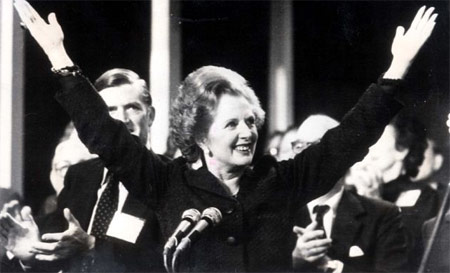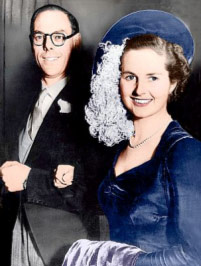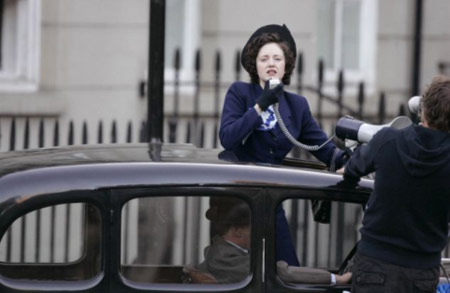|

femail
Mrs
T the temptress - and a woman who knew all about the seductive powers
of politics and wasn't afraid to use them
By Edwina Currie
Last updated
at 4:43 PM on 06th June 2008
A
controversial new film about the young Margaret Thatcher's ten-year
struggle to become an MP is to be screened next week. It tells how
her attempts to break into a world dominated by male MPs were rebuffed
time and again. But she refused to give up and ruthlessly used her
womanly wiles to win through.
The film's writer, Tony Saint, says Margaret Thatcher - The Long
Walk To Finchley is simply how he imagines things might have been.
But one former colleague says it's absolutely spot on. But former
colleague Edwina Currie says it's absolutely spot on...
Within the tea-rooms and bars around Westminster, there was often
just one subject of conversation that would excite MPs of all parties:
Margaret Thatcher. It wasn't her policies or her politics that got
them going.
Oh no. From the moment she came into Parliament in 1959 at the age
of 33, she had been seen as an object of their sexual curiosity,
and, it has to be said, their fantasy.
Grown men who should have known better speculated about what it
might be like to have sex with her. There was much discussion about
the type of underwear she might have worn. Sensible voluminous cotton
modesty-protectors? Wispy silken threads? Or none at all?
The ever-priapic Alan Clark - who was once caught on camera gazing
lustily at her derriere - would wonder out loud whether she was
wearing stockings and suspenders (he liked to believe she did) and
a lot of other politicians, some of them the holders of very high
office indeed, would join in the debate.
The men found her excitingly formidable for all sorts of reasons.
She was their fantasy teacher. They longed to have her spank them.
She was both Florence Nightingale, come to rescue them in times
of trouble, and Joan of Arc, battling against dragons.
What she wasn't was a real flesh-and-blood person. Other women in
the Commons - and that included many hundreds who worked as secretaries,
researchers and librarians - were fair game for the men. They could
be flirted with, courted and teased. Some were even marriage material
- Nigel Lawson wed a librarian and Norman Fowler a researcher, for
example.
But no man, without exception, would dare to take Margaret on, even
when she was a young, fresh, and breathless newcomer. They preferred
to fantasise at a distance. It wasn't because she was already married
to Denis, but because she was unique, special - and focused. Everyone
knew it.
I was vividly reminded of her tunnel vision in the first few minutes
of Margaret Thatcher - The Long Walk To Finchley.
A personnel officer for a chemical company has just hired Margaret
- superbly portrayed by Andrea Riseborough - and asks what her outside
interests are so she can be linked up with like-minded employees.
Aged 23 and just out of Oxford University, Margaret is bemused.
'Choral singing, perhaps,' suggests the woman, 'or needlework?'
Eventually a stumped Margaret manages an answer. 'Politics,' she
says, with more than a note of apology in her voice.
Enlarge

Fantasy:
Male MPs kept their distance from unique Margaret
And that's all that Margaret is interested in, as the film makes
clear and as I know from my own experience of her.
Margaret gets
it right - as in real life - by taking on a steady job to fund her
political ambitions. You need a salary from a boring job that is
not emotionally or physically demanding - you save all your energy
for the politics.
In her case,
she is shown testing ice cream, but apparently in truth she was
hired to test cake mixes for the J. Lyons tea shop chain. How boring
is that?
The idealistic Margaret sets out thinking that all she has to do
to get adopted for a seat and then get elected is to offer liberal
helpings of common sense for every problem.
But Britain
in the 1950s was run by returning war heroes and an old school tie
network. Politics was seen as men's work. As one lady constituency
selector tells Margaret: 'A woman's place is in the home, not in
the House.'
Standing in
the solidly Labour constituency of Dartford, Kent, she wangles her
way into working men's clubs, where women are banned, and busies
herself pulling pints. 'Remember,' she shrills to astonished drinkers,
'a Conservative government will be a tax-cutting government.'
he gets little
help from neighbouring constituencies, although being only 23 and
attractive, she gets a lot of attention. The jealous Tory candidate
for Bexley, a young Ted Heath (gloriously played by Sam West), can't
stand her but grudgingly concedes to Orpington's MP, Sir Waldron
Smithers (Michael Cochrane), that 'there is something about her'.
'Yes,' replies
Smithers, taking a swig of whisky. 'The whiff of cheap perfume.'
(I don't remember Margaret ever wearing any perfume - but if she
did, it would never have been cheap).
What the film
doesn't get quite right is that she was never as gawky and gauche
as Andrea Riseborough makes out. In fact, she was well brought up
with many social graces and had learned the politician's trick of
remembering everyone's name and face early in her career.
Heath gets in
and it quickly becomes clear that he is a rising star in Parliament,
so Margaret tries to get him on her side. At a constituency ball,
she takes him outside for a chat.
'With men like
you thrusting,' she tells a startled Heath, 'a Conservative government
can't be far away.' All she wanted was help and advice, but Ted
was never comfortable in the company of women.
Indeed, there
is speculation in the film - just as there used to be in the tea
rooms - that he was uninterested in the opposite sex.
'He is very
close to his mother, you know,' says one character meaningfully.
He may have misinterpreted Margaret's attempt at getting him on
her side and thought she was propositioning him. But she only wanted
him to help her in the way she had helped him win Bexley, although
her language is seductive.
'Do you find
it in your heart to take a young girl by the hand and guide her
into Parliament?' she whispers. 'Take me with you on your journey
to power.'
Heath is insulted
that she is implying he owes the seat to her. 'We shall never speak
of this again,' he mutters pompously. Later, as a Whip, he is asked
to sabotage her selection prospects.

The
lady turns heads: Denis and Margaret Thatcher on their wedding day
in 1951
In the meantime, being a man, having a family, wearing an old school
tie and a row of medals across your chest got you everywhere. I
know how true this is because I came up against it myself.
Nearly 25 years later, I studied Margaret's problems and tried to
learn from her experience when I stood for Parliament. When I was
hoping to be chosen for Shrewsbury in Shropshire, another candidate
turned up wearing his Territorial Army uniform and accompanied by
his pregnant wife. Guess who was selected.
But
all these years later, his family rebounded on him - for this was
Derek Conway, who found himself in deep trouble for employing his
wife and sons on non-jobs at taxpayers' expense.
Margaret
tries other no-hope seats, but still gets nowhere. 'Damn the Establishment,'
she fumes. By now she has met Denis (played by Rory Kinnear). Divorced,
rich and eternally cheerful, he clearly adores her - as Denis was,
and did, in real life.
As
a condition of accepting his stammered marriage proposal, she makes
him promise he will never try to deflect her from her ambition.
The film glosses over their wedding. Denis asks her father, the
formidable Alderman Roberts, (Philip Jackson) for her hand, and
is sternly told that it's up to Margaret.
But
the truth, I understand, is that he didn't approve of Denis because
he was divorced and, perhaps worse, liked a drink. It is said that
Margaret's parents didn't go to the wedding.
After her father died, a friend who visited the Roberts' home in
Grantham, Lincolnshire, reported that there were no pictures of
Margaret and Denis together, or of their children. The last picture
of their daughter on display was at her graduation from Oxford.
On
honeymoon in France, we are given another glimpse into Margaret's
focus. When their lovemaking finishes, Denis rolls over and Margaret
promptly switches on the light and resumes her studies. When she
gives birth to twins, Mark and Carol, she tells Denis that they
now have the perfect family, a boy and a girl - 'so there's no need
to go through all that again'.
Denis
looks stunned. 'What, never?' he asks forlornly. He tells the babies:
'Congratulations, you've just made your mother very happy.'
What
was Margaret like as a wife and mother? The film shows her baking,
knitting and snipping recipes out of the paper, but the children
are a distraction from Margaret's all-consuming goals.
Was
that so in real life? A former neighbour once said that whenever
Margaret went out, leaving the children with their nanny, she would
stride down the road without so much as a backward glance.
Denis on the other hand, would frantically wave at his children
in the window the moment the front door shut behind him. In the
film, Denis is away in Africa a lot on business. This is only a
problem for Margaret if the family-minded constituency selectors
insist on meeting her husband before they make their mind up.
'Mummy,
can I go to South Africa one day, like Daddy?' asks Mark with foresight.
'I promise I won't get into trouble.'
Eventually, after being turned down in Beckenham and Hemel Hempstead,
Margaret asks Denis for advice. 'Your perceived weakness is that
you are a woman,' he reminds her. 'But that can be your strength
if you work on it.'
Margaret becomes consciously more feminine. She lightens her hair,
modulates her voice from strident to low and sexy, wears tops that
show a hint of cleavage and skirts that display a flash of leg.
The
dramatic change in her is exactly how it was. You can trace that
in the photographs of her at 18. She was serious and dowdy. There
is nothing coquettish or fun-loving about her in those days.
She
managed to sail through Oxford without a boyfriend, which took some
doing, considering she was basically very pretty and surrounded
by lusty young men. When I was there, after her, there were five
women's colleges to 25 men's, so we had plenty of choice.
With
Margaret discovering her new femininity, she visits the candidates'
chairman at Conservative Central Office. Dressed to kill, she presents
herself as a helpless woman being held back by men and tearfully
enlists his help to get a seat.
This,
I am convinced, is very close to the truth but we shall never know
for sure because there were only two people in the room. One - the
chairman - is now dead, and the other, Margaret, will never tell.
There
are just two recorded times in her life when she has cried. The
first when her son Mark got lost rally-driving in the Sahara; the
other when she was ousted from No 10. But the tears work because
the embarrassed chairman suggests she applies for the safe seat
of Finchley in North London, where the incumbent, Sir John Crowder
(Geoffrey Palmer) is retiring. Everyone does what they can to impede
Margaret but she makes the shortlist as the token woman.

On
the campaign trail: Margaret(Andrea Risborough) uses her charms
I should add here that in politics it is not just the chaps who
are the enemy. Some wives deeply resent women MPs because they think
we are after their husbands. Once or twice they are right, of course.
The candidates' chairman advises her on getting through the final
selection process. 'Wear a black suit with perhaps a little gold
trim,' she is told. 'It suggests seriousness. Make sure your skirt
is knee length, pin a brooch to your lapel and wear a hat set back
so your face is not in shadow.'
That
particular scene made me jump out of my skin because it mirrored
my own experience. I was given exactly the same advice on the eve
of the selection for South Derbyshire. It worked for me - I held
the seat from 1983 to 1997. And as everyone now knows, it worked
for Margaret in Finchley in 1959. The film ends here, with Margaret
having achieved her ambition. But it was just the birth of the Iron
Lady and a political career that would make her Britain's most outstanding
and charismatic leader since Winston Churchill.
Within three years, her hair by now almost blonde, she was a junior
minister, controversially taking free milk away from schoolchildren
- although in the film she says if she ever gets to power she's
going to make sure every child gets it.
Ted
Heath's hatred of her became life long, although when he was prime
minister he put her into his government as the token woman. She
was also the brightest and best around. She had a good mind, a scientific
background and she could add up, which most men couldn't.
I
would like to say that Margaret's great struggle made it easier
for women to get into Parliament, but I don't think it did. More
than 20 years after she won her great battle I was encountering
the same prejudices against women because old buffers still ran
things.
On
my first day in Parliament one of them asked me: 'So which MP are
you working for, my dear?' Some things change, but in politics it
seems they always stay the same. Margaret's allure was, if anything,
enhanced during her time in power. U.S. president Ronald Reagan
was smitten by her - 'Margaret and I have a special relationship,'
he would say. He particularly loved it when she stood up to him,
which he found sexy.
Russia's
president Mikhail Gorbachev admitted he found her fascinating, while
French president Francois Mitterrand described her as having 'the
eyes of Caligula but the mouth of Marilyn Monroe'.
Half
her Cabinet were probably secretly in love with her. The other half,
along with all the tea room Lotharios, were deeply in lust. The
only man she never won over was Ted Heath.
Margaret Thatcher - The Long Walk To Finchley is on BBC4 on Thursday,
June 12 at 9pm.
Part of the Daily Mail, The Mail on Sunday, Evening Standard &
Metro Media Group
© 2008 Associated
Newspapers Ltd
Previous Page
Click
here to print this page
|





